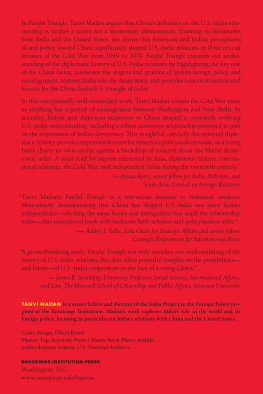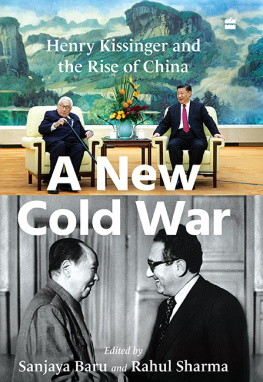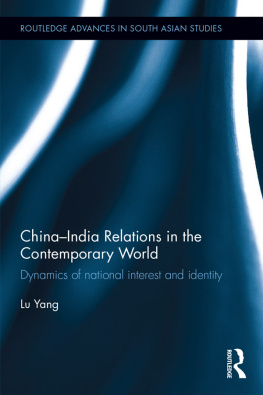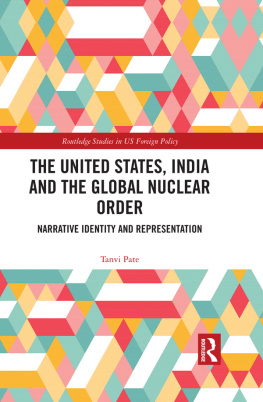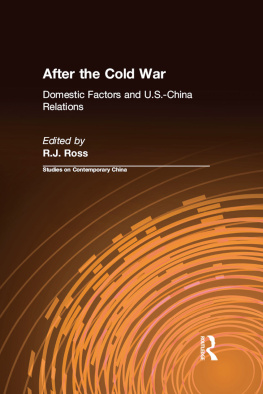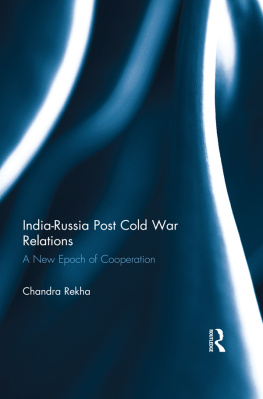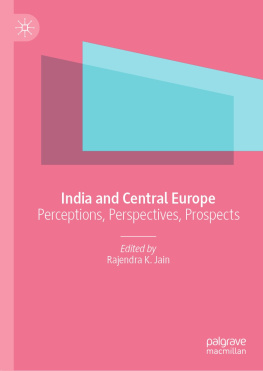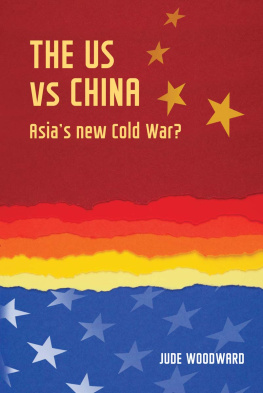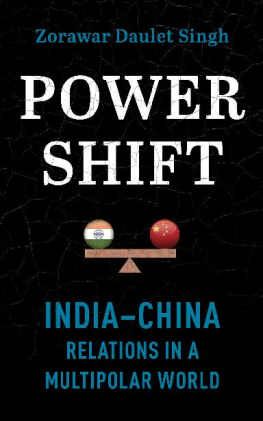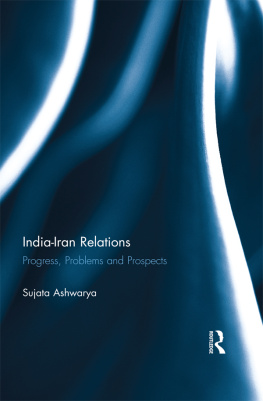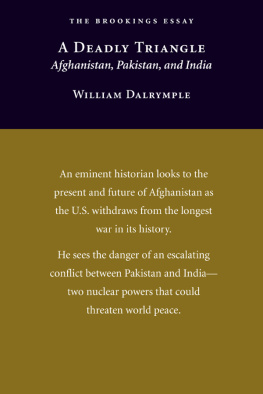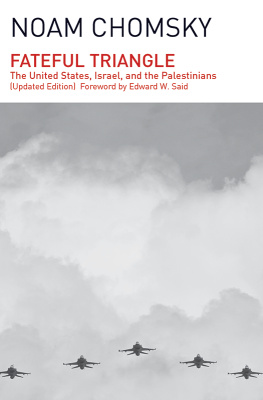Tanvi Madan - Fateful Triangle: How China Shaped U.S.-India Relations During the Cold War
Here you can read online Tanvi Madan - Fateful Triangle: How China Shaped U.S.-India Relations During the Cold War full text of the book (entire story) in english for free. Download pdf and epub, get meaning, cover and reviews about this ebook. publisher: Brookings Institution Press, genre: Politics. Description of the work, (preface) as well as reviews are available. Best literature library LitArk.com created for fans of good reading and offers a wide selection of genres:
Romance novel
Science fiction
Adventure
Detective
Science
History
Home and family
Prose
Art
Politics
Computer
Non-fiction
Religion
Business
Children
Humor
Choose a favorite category and find really read worthwhile books. Enjoy immersion in the world of imagination, feel the emotions of the characters or learn something new for yourself, make an fascinating discovery.
- Book:Fateful Triangle: How China Shaped U.S.-India Relations During the Cold War
- Author:
- Publisher:Brookings Institution Press
- Genre:
- Rating:3 / 5
- Favourites:Add to favourites
- Your mark:
- 60
- 1
- 2
- 3
- 4
- 5
Fateful Triangle: How China Shaped U.S.-India Relations During the Cold War: summary, description and annotation
We offer to read an annotation, description, summary or preface (depends on what the author of the book "Fateful Triangle: How China Shaped U.S.-India Relations During the Cold War" wrote himself). If you haven't found the necessary information about the book — write in the comments, we will try to find it.
Tanvi Madan: author's other books
Who wrote Fateful Triangle: How China Shaped U.S.-India Relations During the Cold War? Find out the surname, the name of the author of the book and a list of all author's works by series.
Fateful Triangle: How China Shaped U.S.-India Relations During the Cold War — read online for free the complete book (whole text) full work
Below is the text of the book, divided by pages. System saving the place of the last page read, allows you to conveniently read the book "Fateful Triangle: How China Shaped U.S.-India Relations During the Cold War" online for free, without having to search again every time where you left off. Put a bookmark, and you can go to the page where you finished reading at any time.
Font size:
Interval:
Bookmark:
FATEFUL TRIANGLE
How China Shaped U.S.-India Relations during the Cold War
TANVI MADAN
BROOKINGS INSTITUTION PRESS
Washington, D.C.
Copyright 2020
THE BROOKINGS INSTITUTION
1775 Massachusetts Avenue, N.W., Washington, D.C. 20036
www.brookings.edu
All rights reserved. No part of this publication may be reproduced or transmitted in any form or by any means without permission in writing from the Brookings Institution Press.
The Brookings Institution is a private nonprofit organization devoted to research, education, and publication on important issues of domestic and foreign policy. Its principal purpose is to bring the highest quality independent research and analysis to bear on current and emerging policy problems. Interpretations or conclusions in Brookings publications should be understood to be solely those of the authors.
Library of Congress Cataloging-in-Publication Data
Names: Madan, Tanvi, author.
Title: Fateful triangle : how China shaped U.S.-India relations during the Cold War / Tanvi Madan.
Description: Washington, D.C. : Brookings Institution Press, [2020]
Identifiers: LCCN 2019026909 (print) | LCCN 2019026910 (ebook) | ISBN 9780815737711 (paperback) | ISBN 9780815737728 (epub)
Subjects: LCSH: United StatesForeign relationsIndia. | IndiaForeign relationsUnited States. | United StatesForeign relationsChina. | ChinaForeign relationsUnited States. | United StatesForeign relations1945-1989. | Cold War.
Classification: LCC E183.8.I4 M235 2020 (print) | LCC E183.8.I4 (ebook) | DDC 327.73054dc23
LC record available at https://lccn.loc.gov/2019026909
LC ebook record available at https://lccn.loc.gov/2019026910
9 8 7 6 5 4 3 2 1
Typeset in ITC Berkeley Oldstyle and Hypatia Sans Pro
Composition by Electronic Quill Publishing Services
To Mummy, Papa, and Nidhi
Contents
This books origin story lies at the Lyndon B. Johnson Library in Austin, Texas. Perusing White House papers, I was struck that officials, including the president, kept mentioning China while discussing India. Much had been written about India-Pakistan hyphenation from that era. But while India-China hyphenation is common in Washington today, there had been little mention of American policymakers viewing India through a China prism during the Cold War. I was intrigued. And I wanted to know if the Johnson administration discussions were a one-off and whether the linkage was one sided; that is, had policymakers in Delhi, too, connected Indias China and US relationships? Those questions started me on a journey toward a doctoral dissertation and eventually this book. It took a village to get me through this voyage, and to its denizens I am eternally grateful.
At the LBJ School of Public Affairs at The University of Texas at Austin, I was fortunate to have a doctoral committee that gave me constructive feedback and support. Frank Gavin, Will Inboden, Mark Lawrence, Jim Steinberg, Jeremi Suri, and Kate Weavers guidance greatly enriched this work. Historians, political scientists, and policy practitioners, they gave me the space to pursue research that might not please a disciplinary purist but will hopefully contribute in its own way to the academic and policy worlds. A special thanks to Jim, who has been an adviser, boss, and mentor. He encouraged me to develop an expertise on India, which I had resisted in the quest to be a national security generalist, and challenged me to take on this project, which initially seemed too ambitious.
I cannot say enough about the Brookings Institution, which has been my intellectual and professional home for several years and where I completed this project. Its scholars and staff are not just some of the smartest people I know, but also some of the nicest. I am grateful for their support and scholarship, as well as their friendship. I would particularly like to thank Strobe Talbott and Martin Indyk for showing immense faith in me as a young scholar and for their indispensable support. Bruce Jones, as head of the foreign policy program, has been very supportive of my work. Special thanks also to current and former colleagues Charlotte Baldwin, Megan Bradley, Fiona Hill, Margaret Humenay, Dhruva Jaishankar, Suzanne Maloney, Shivshankar Menon, Anna Newby, Natan Sachs, Kevin Scott, Tamara Wittes, Thomas Wright, and Constantino Xavier. In addition, I am grateful to Purwa Bansod, Neha Aggarwal, Hunter Marston, and Laura McGhee, whose support for the India Project at Brookings allowed me to focus on this book, and to Agni Mishra and Laura Mooney for helping me track down some hard-to-find sources.
This project would not have been possible without the generosity of the Donald D. Harrington Fellows Program and the J. J. Jake Pickle Scholarship Program at UT-Austin, the LBJ Foundation, and the Brookings India Initiative Founders Circle. It would also not have been possible without the education that I received and the love for history that I developed thanks to teachers at some outstanding institutionsnot just UT-Austin, but also Loreto Delhi, Lady Shri Ram College, and Yale University.
This book has benefited from comments from three external reviewers, my friend and international historian extraordinaire Srinath Raghavan, as well as Mike OHanlon, who also shepherded this book through the review process. I am thankful to them, as well as to archivists in Britain, India, and the United States, without whose assistance this would have been a lesser bookand likely a much shorter one. It is also a better manuscript because of the work of the Brookings Institution Press team, to whom I am grateful. My thanks also to Penguin Random House India.
A number of friends, colleagues, and family members made sure that I was not alone on the journey that resulted in this book. They provided advice, feedback, friendship, support, and hospitality, put up with my whining and doubts, and made this endeavor enjoyable. I owe a debt of gratitude to Rashmi, Deepak, and Radhika Appaya; Ridhika Batra, Fred Beach; Madhuri Bhalla; Madhulika Bhattacharya; Emily Brownell; Amanda Cause; Amit Chanda and Urmila Venugopalan; Rudra Chaudhuri, Aysha Chowdhry, Carolyne Davidson and Ken Riggsbee; Eleanore Douglas and Matthew Hager; Sadanand Dhume, Parul Dua, Chester Finn Jr., and Renu Virmani; Ziad Haider and Aakanksha Pande; Anne Kramer; Brendan Lavy; Cesar Martinez; Anit Mukherjee; Shannon Nagy; Angela Newell; Stephen Palmer; Jason Parker; Mahima Puri; Aaron Rak; Ariel Schwartz; Jeremy Shapiro; Seema Sirohi; Sarah Steinbock-Pratt; Alexandra Stone; Poonam, Nalin, Radhika, and Aditi Surie; Jennifer Taylor; Milan Vaishnav; Kripa Williams; Constantino Xavier; and Wenjie Zhang, as well as my extended Batra and Madan families.
I wish I had completed this book while two individuals were still with us. My former boss and guru Stephen P. Cohen will continue to serve as a role model, not just as a scholar who did policy-relevant research, but also as a good human being. And my grandfather, Prakash Chandra Suri, dedicated himself to helping build India and continues to remind me of the importance of public service, integrity, and productivity.
Finally, this book would not have been possible without my parents, Nishi and Viren Madan, and my sister Nidhi. This work is a product of their love, support, generosity, and honest feedback. It is as much theirs as it is mine. It is to them that I dedicate this book, with much love and gratitude.
If in 10 or 15 yearsor sooner, but 10 or 15 yearsChina begins to act aggressively externally and in a hostile way, these two countries [India and the US] will come together naturally. So they do not have to plan for it; theyll come together. So they dont have to plan for it; it will happen, it seems to me, because they are natural allies.
Font size:
Interval:
Bookmark:
Similar books «Fateful Triangle: How China Shaped U.S.-India Relations During the Cold War»
Look at similar books to Fateful Triangle: How China Shaped U.S.-India Relations During the Cold War. We have selected literature similar in name and meaning in the hope of providing readers with more options to find new, interesting, not yet read works.
Discussion, reviews of the book Fateful Triangle: How China Shaped U.S.-India Relations During the Cold War and just readers' own opinions. Leave your comments, write what you think about the work, its meaning or the main characters. Specify what exactly you liked and what you didn't like, and why you think so.

